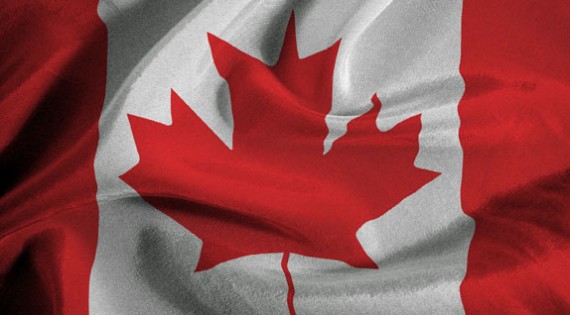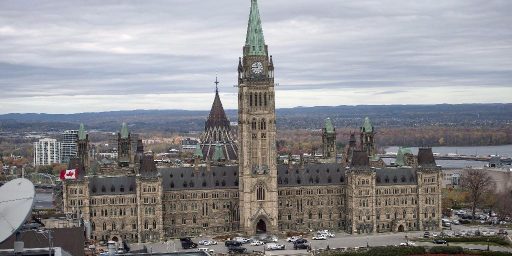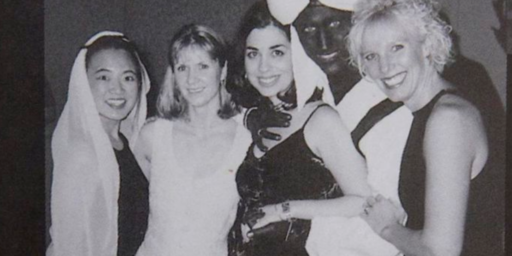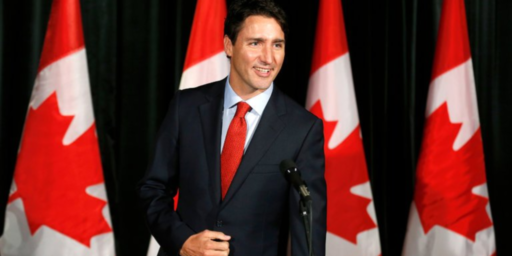Harper Calls Canadian Elections For October 19th
Over the weekend, Canadian Prime Minister Stephen Harper started the process that will lead to national elections in October:
OTTAWA — Prime Minister Stephen Harper of Canada called federal elections on Sunday, hoping to extend his Conservative Party’s decade-long hold on power despite questions about its ethics and a struggling economy.
By law, Mr. Harper had to hold a vote in October. But he broke with Canadian political tradition by formally opening the campaign in the middle of summer during what is a holiday weekend in most of the country. The move appeared designed to give the Conservative Party an edge in campaign spending. The campaign period before the vote on Oct. 19 will be the longest since Canadians all began voting on a single day in 1874.
On Sunday, Mr. Harper said that the state of the economy, which his opponents view as his weakness, was the main reason to re-elect his government.
“It’s an election about who will protect our economy in a period of ongoing global instability,” Mr. Harper said after asking David Johnston, the governor general, to dissolve Parliament. “Now is not the time for the kind of risky economic schemes that are doing so much damage elsewhere in the world.”
Thomas Mulcair, the leader of the New Democratic Party, criticized Mr. Harper for producing eight budget deficits in a row and increasing the federal debt.
“Mr. Harper has the worst economic growth record of any prime minister since 1960,” Mr. Mulcair said. “Obviously, Mr. Harper, your plan isn’t working.”
Mr. Harper’s Conservative party first took power in 2006 and has won two elections since then, gaining a majority of seats in the House of Commons in 2011. But over the past two years, concerns over the economy and ethics issues have eroded the popularity of Mr. Harper and his party.
A collapse in oil prices has severely depressed Canada’s energy industry, which is based in Mr. Harper’s adopted home province of Alberta. And despite a corresponding drop in the value of the Canadian dollar, there has not been a hoped for jump in exports of Canadian goods.
Mr. Harper’s party, which came to power partly because of a spending scandal involving a Liberal government, has also faced criticism over allegations of misspending by members of the unelected Senate, as well as the criminal trial of one of Mr. Harper’s appointees. And a former parliamentary secretary to Mr. Harper was recently sentenced to a month in jail and house arrest and fined for breaking election spending laws.
(…)
Yasmin Dawood, a professor of law and political science at the University of Toronto, said the timing of the elections appeared intended to enable the Conservatives, who overwhelmingly lead in fund-raising, to outspend opponents.
Election law changes introduced last year set a minimum of 37 days for campaigns but do not impose a maximum. The law means that parties would in theory be able to spend a maximum of about 25 million Canadian dollars, or $19.1 million, for the first 37 days of the election plus an extra 685,185 Canadian dollars for every day afterward. Fund-raising filings up until last month show that, barring a flood of funds for opposition parties, only the Conservatives would have the money to spend the maximum allowed.
Cristine de Clercy, a professor of political science at the University of Western Ontario in London, Ontario, said that even if Canadians were put off by a long campaign, it was unlikely to affect how they vote. She said that the defining issue of the campaign would probably be the economy.
“It’s not necessarily fair to blame the federal government for the collapse in oil prices, but there are some deeper problems,” Ms. de Clercy said. “Where I live in Southern Ontario, we’ve been shedding manufacturing jobs for the last eight to 10 years.”
This will be the first campaign as party leader for both Mr. Mulcair and Justin Trudeau, head of the Liberal Party.
While Mr. Mulcair, a lawyer from Quebec, has been widely viewed as an effective opponent of Mr. Harper’s in Parliament, he remains relatively unknown in the rest of the country and is seen as lacking in charisma.
Mr. Trudeau, as the son of Pierre Elliott Trudeau, a former prime minister, grew up in the public eye and shares his father’s charisma. Richard Johnston, a political scientist at the University of British Columbia in Vancouver who specializes in polling, said that Mr. Trudeau must overcome two blunders during the campaign.
Voters on the center right, he said, were offended when Mr. Trudeau made a joke about Canada’s use of its fighter aircraft against Islamic State targets. And younger voters and center-left voters, Mr. Johnston said, were dismayed by his decision to support sweeping national security legislation introduced by Mr. Harper, although Mr. Trudeau said the Liberals would amend it if they came to power.
I am hardly an expert on Canadian politics, so I will have to rely on other analysts as the campaign goes on. As things stand, though, the consensus seems to be that Harper’s Conservative is likely to maintain their majority , with the real battle being between Trudeau and Mulcair for which of their respective parties would become the principal opposition party. In any case, the CBC already has a poll tracking site set up for the campaign so if you’re bored with an American Presidential election that is already becoming tiresome, you can always follow the electoral adventures of our neighbors to the north.





The Tories utilize an American-style endless campaign approach focusing on personal attacks against future rivals. Harper’s government is oriented toward continually trashing everybody else (repeat it enough and people will believe it) and surviving the endless corruption scandals from a party that sees the public treasury as an all-you-can-eat buffet. Combined with their fundraising advantage Harper will probably come out on top again.
The economics of the Alberta tar sands has evaporated with the oil price reduction. I can only assume that Harper hopes the impact of this will not be noticed by the Canadian voters in October.